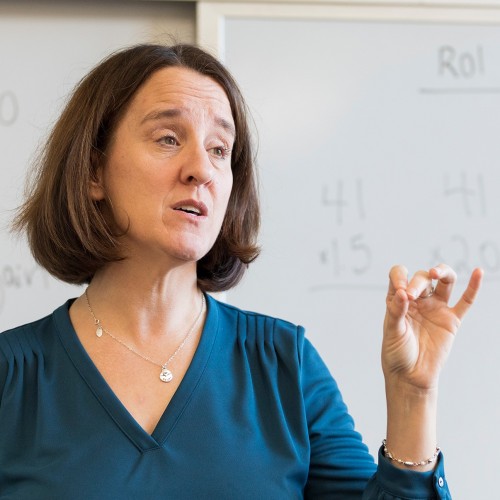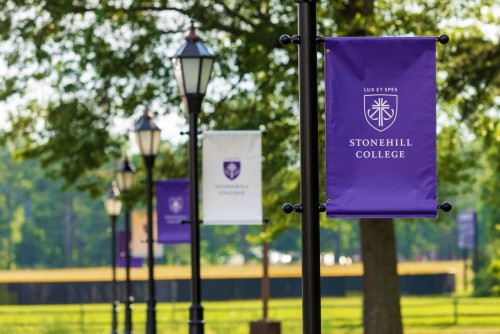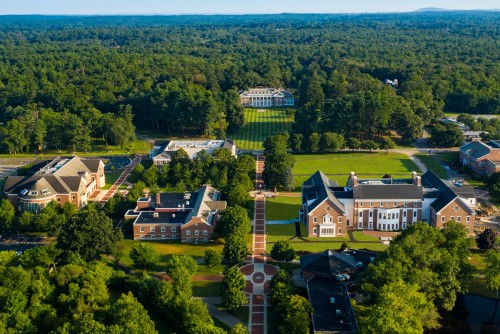Empowering Tomorrow’s Teachers
Emphasis on field experience and compassion defines Stonehill’s Education Program.
The Education Program offers the core strengths you’d expect at Stonehill: a foundation of classroom-taught pedagogical theory rounded out with real-world experience. But look just beyond those elements and the real X factor of the program emerges: a simple love of teaching shared by faculty and students alike.
“We have an incredible opportunity to make real change in the world through our students, who will go out and reach the lives of thousands of children throughout their careers,” notes Professor Margaret Pierce, chair of the Education Department.
The Department offers four undergraduate majors that result in Massachusetts teacher licensure (early childhood education, elementary education, secondary education and special education) as well as a non-licensure major in education studies. In addition, there is a master’s degree in inclusive education with five specialization tracks.
Jessica Gustafson ’18 teaches fifth grade class at Wamsutta Middle School in Attleboro, Massachusetts.
A Program Grounded in Field Experience
The real-world impact that inspires faculty and students alike begins with field placement opportunities that, unlike other programs, are available in undergraduates' first year. While optional, first-year classroom placements are encouraged. “Experience anchors learning,” adds Pierce. “It also offers an early chance for our students to confirm that education is truly the career for them.”
Placements across pre-K to secondary grade levels, in a range of urban and suburban settings, further reveal a student’s interests when it comes to their future careers. “A school is the hub of a community, and we got to see how education works for different communities — how it reflects its values,” says Michael Astuccio ’13, now an assistant principal in Newbury, Massachusetts.
Real-world experiences are also found beyond traditional school walls. Jessica Gustafson ’18 recalls how volunteer teaching with School on Wheels, an after-school program for homeless children, impacted her perspective throughout her years at Stonehill. “It was humbling to realize that when these students left the Tutoring Center, they weren’t going home to secure housing,” she says. “But I got to watch them grow.”
Jessica Gustafson '18 works with students on science project.
Broad-Based Curriculum Enhances Students’ Ability to Teach
With Stonehill’s liberal arts curriculum, students emerge as well-rounded thinkers with a firm grasp of teaching fundamentals and greater global awareness. For Astuccio, an elective — Art, Music and Movement — offered insight he regularly draws on today. During the class, professor of education Karen Anderson regularly referenced “The 100 Languages of Children,” a poem with an expansive view of education incorporating creativity and movement. “It suggests that teaching works best when we support students’ sense of self-esteem and help them develop as people ready to step out into the world,” Astuccio says.
Ultimately, Pierce says, the range of courses in history, literature, social sciences and science confer knowledge and skills that build Stonehill students’ capacity to teach. “Our approach makes our students better learners, and that in turn helps them understand how to share information more effectively,” she adds.
Stonehill education students tutor elementary aged children from the local community.
Forward-Thinking Program Keeps Pace With an Evolving Field
Program faculty consistently evaluate curricula to ensure they keep pace with evolving classroom realities and K-12 curriculum standards. An emphasis on equity highlights inclusive teaching methods and the importance of dismantling stereotypes in the classroom so every student thrives. “I’ve always understood education as a tool for equity,” says Astuccio. “We have a highly neurodiverse population in our district, and Stonehill equipped me to understand how to provide for different populations with different needs.”
The forward-thinking curriculum yields confident educators — whether graduates ultimately choose to become classroom teachers, administrators, curriculum developers or librarians. Even opportunities in speech-language pathology are possible with the addition of a minor in Stonehill’s speech-language pathology program.
Elizabeth Jalette ’23, an elementary education and psychology double major, completed her practicum at nearby Richardson Olmsted Elementary School. There, she realized how well prepared she was for her post-college career. “The school recently had a professional development day focused on the science of reading — a major emphasis for statewide curricula,” she notes. “My Stonehill classmate and I shared a moment of recognition, because differentiating instruction is something we’ve been taught to do from day one.”
Our approach makes our students better learners, and that in turn helps them understand how to share information more effectively.
4 Years, 2 Degrees — and 1 Consistent Experience
After earning their bachelor’s degree, education students can deepen their knowledge of by continuing for a further year to complete Stonehill’s Inclusive Education Master’s Program, which also offers Massachusetts teacher licensure in math/science or special education. Jamie St. Peter, M.Ed. ’21, says the opportunity to study with the same professors while earning both degrees provided a supportive thread from freshman year through the first teaching role. St. Peter is now a fifth-grade special education teacher at Wampatuck Elementary School in Scituate, Massachusetts.
“We have a math interventionist who approached our team to train us on a tool called Number Talks,” she explains. “That was something I’d learned in sophomore year. Then the same professor brought Numbers Talks back in graduate school — and now here they are in my real-life work. I’m able to consistently make connections to what I learned throughout my time at Stonehill.”
Inclusive Education Master's Degree at Stonehill including teacher residency options.
-
Request Information
Sign up now to be added to our mailing list, and we will show you how Stonehill could become part of your story.
-
Visit Opportunities
Our visit programs will help give you a better understanding of how Stonehill’s expansive leadership and experiential learning opportunities equip students for success in a rapidly evolving and globally competitive world.
-
Apply for Admission
Stonehill College provides an exceptional learning experience for both undergraduate and graduate students. We invite you to review the process, requirements and application deadlines for our entry options.



